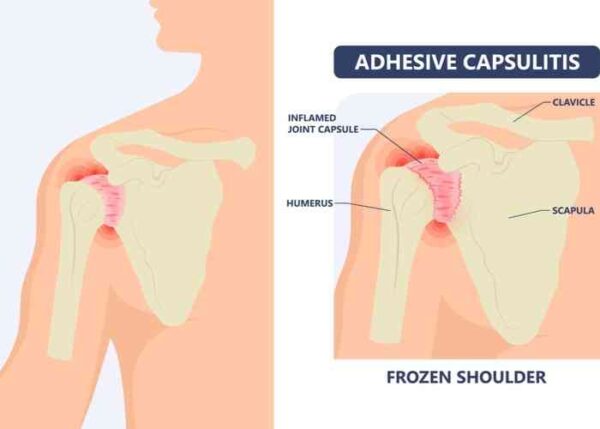Frozen Shoulder Specialist

Are you experiencing a stiff shoulder? If so, you may be suffering from a condition known as frozen shoulder. Frozen shoulder typically affects patients between the ages of 40 and 60 years, and females are much more likely to develop this condition than males. Sift shoulder specialist, Dr. Matthew Provencher provides diagnosis and both surgical and nonsurgical treatment options for patients in Vail who have developed frozen shoulder. Contact Dr. Provencher’s team today!
What is Frozen Shoulder (Adhesive Capsulitis)?
Frozen shoulder, otherwise known as adhesive capsulitis, is a painful and troublesome shoulder condition which restricts normal joint movement and causes joint pain. This condition develops when the joint’s soft tissue begins to thicken and contract from scar tissue formation. In some cases, a “stiff shoulder” can cause a patient to lose complete joint function and range of motion. Vail, Aspen, Colorado Springs and Denver, Colorado area orthopedic shoulder specialist, Dr. Matthew Provencher is trained and highly experienced in treating frozen shoulder.
As the shoulder’s soft tissues begin to thicken and contract, scar tissue (adhesions) is formed. The scar tissue is responsible for creating pain and loss of normal shoulder function. Over an extended period of time, patients begin to move the shoulder less because of pain, leading to increased joint stiffness. The term “frozen shoulder” is used because the more pain a patient feels, the less likely they are to use the joint. The lack of movement causes scar tissue to thicken even more and “freeze” in position.
The two types of frozen shoulder include:
- Primary adhesive capsulitis- This type of frozen shoulder occurs for no apparent reason, causing a patient to slowly lose shoulder motion.
- Secondary adhesive capsulitis- This type of frozen shoulder occurs after a shoulder injury or previous shoulder surgery.
What are the Symptoms of Frozen Shoulder?
Adhesive capsulitis symptoms are divided into three distinct stages:
- “Freezing” stage- Lasting from six weeks to nine months, the shoulder becomes stiff and painful with loss of motion.
- “Frozen” stage- Lasting two to six months, the shoulder joint remains stiff but the pain level may lessen.
- “Thawing” stage- Lasting six months to two years, pain lessens and the shoulder gradually returns to normal joint function.
How to Know if you Have Frozen Shoulder
After reviewing a patient’s medical history and performing a physical examination, Dr. Provencher will be able to diagnose adhesive capsulitis. He may also perform an MRI and series of x-rays to determine if loss of joint function and increased pain are associated with another shoulder condition or injury.

What are the treatment options for Frozen Shoulder?
Dr. Provencher begins frozen shoulder treatment with non-surgical measures such as rest, ice and medications in many cases. He may also prescribe a detailed physical therapy program to return full motion and function to the joint. It is strongly suggested that patients work with the in-house physical therapists at Howard Head Sports Medicine to optimize their rehabilitation.
When to Have Surgery for Frozen Shoulder?
If non-surgical treatment does not alleviate symptoms, Dr. Provencher may recommend arthroscopic shoulder surgery. This technique is designed to release tight areas within the joint. After the tight areas are released, Dr. Provencher will remove scar tissue around the affected area to relieve pressure. An aggressive physical therapy program must be followed after undergoing surgery for frozen shoulder to maintain full motion and joint function.
For additional information on frozen shoulder, or adhesive capsulitis, please contact the orthopedic office of Dr. Matthew Provencher, shoulder specialist treating patients from the communities of Vail, Aspen, Colorado Springs and Denver, Colorado.